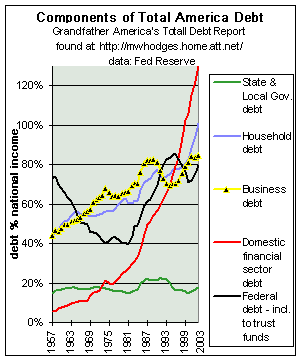U.S. 2005 Record Trade Deficit!
U.S. racks up record
trade deficit in '05
$725.8 billion total is 17.5% increase over 2004's mark
San Francisco Chronicle | February 11, 2006
 The United States racked up a record-high trade
deficit with the rest of the world in 2005, setting off a political firestorm
that's being felt from Washington to Beijing, roiling U.S. manufacturers and
organized labor, and prompting Congress to consider new laws to rein in the
losses.
The United States racked up a record-high trade
deficit with the rest of the world in 2005, setting off a political firestorm
that's being felt from Washington to Beijing, roiling U.S. manufacturers and
organized labor, and prompting Congress to consider new laws to rein in the
losses.
The $725.8 billion deficit, announced Friday by the Commerce Department, was a 17.5 percent leap from 2004's then-record deficit of $617.6 billion. The 2005 trade deficit equaled 5.8 percent of this country's gross domestic product, up from 5.3 percent of GDP in 2004 and 4.5 percent in 2003.
The United States hasn't had a trade surplus since 1975.
Last year's imbalance was caused by the sharp rise in imported petroleum products and increases in textiles, clothing, manufactured goods and food from abroad, the Commerce Department reported. Even the U.S. farm sector, traditionally a net exporter, recorded a $4 billion deficit in 2005.
Some $201.6 billion of the nation's trade deficit was with China alone, an all-time high for a trade deficit with any country. This gives new energy to China's critics, who charge that the Asian giant deliberately undervalues its currency to make its exports artificially cheap and illegally subsidizes Chinese companies in violation of World Trade Organization rules.
The huge trade deficits -- both with China and with the world as a whole -- left economists, politicians and others debating over just what the numbers mean in real-life terms for American workers and consumers. There is by no means a consensus, especially given the strong political opinions galvanized by trade, and the domestic agendas attached to those opinions.
Broadly speaking, free-traders, including advocates of increasing trade with China, say American consumers benefit from the flood of imports from China and other low-cost producers by being able to load up on consumer goods at low prices.
Free-trade critics say that the trade deficit hurts blue-collar Americans by pushing them out of relatively well-paying manufacturing jobs and into lower- paying service jobs. If the flood of cheap imports could be dammed, American producers could retain workers at higher wages and Americans would benefit by expanding their purchasing power, they say.
"Were the trade deficit cut in half, GDP would increase by nearly $300 billion, or about $2,000 for every working American,'' said Peter Morici, a business professor at the University of Maryland and a frequent critic of U.S. trade policy.
"Productivity is at least 50 percent higher in industries that export and compete with imports, and reducing the trade deficit and moving workers into these industries would increase GDP,'' Morici said. Consequently, "Workers' wages would not be lagging inflation, and ordinary working Americans would more easily find jobs paying good wages and offering decent benefits.''
Defenders of China trade counter that Americans gain more than they lose by engaging Beijing economically. If wages are held down, they say, savings in the form of lower prices put money in Americans' pockets.
According to a study done last month for the U.S.-China Business Council, a Washington organization that promotes business with Beijing, U.S. trade and investment in China nudges this country's GDP higher and lowers the prices Americans pay at the mall for imported TVs, clothes, shoes, and other items.
The study concluded that robust trade with China funnels an average of $1,000 in disposable income to each U.S. household every year.
But those figures, like so many others, are countered with other numbers.
The U.S. Business and Industry Council, which represents small and medium-size manufacturers, says that nearly 3 million U.S. manufacturing jobs have been lost due to low-cost overseas outsourcing and cheap imports from foreign countries since 2000.
The council's president, Kevin Kearns, blamed the problem on the Bush and Clinton administrations' free-trade policies, and called for new surcharges on imports from overseas.
The $201.6 billion trade deficit with China in 2005 was a sharp 24.5 percent jump from 2004's $161.9 billion gap, prompting critics of free trade to concentrate their ire on that country. (Japan was second at $82.7 billion, up 9.4 percent. Canada was third at $76.5 billion, up 15.1 percent.)
Against the backdrop of those numbers, another debate has emerged: whether the statistics reflect the realities of trade and manufacturing.
Beijing officials, who calculate trade statistics differently than U.S. authorities do, have consistently said that the U.S. trade deficit is billions of dollars smaller than Washington contends. Chinese authorities, moreover, say that China serves merely as the place of final assembly for goods made by multinational firms, including U.S. companies, who take the profits from those products, subsequently counted in U.S. trade statistics as Chinese.
On Thursday, the day before the trade deficit was announced, two senators introduced a bill that would strip China of the normal trade status it shares with nearly every other country in the world and subject it to an annual congressional review of its trade policies.
"Particularly disturbing is the news that our trade deficit with China is 2 1/2 times bigger than it was when we signed a (permanent normal) trade agreement with them in 2000,'' said Sen. Byron Dorgan, D-N.D., who introduced the legislation with Sen. Lindsay Graham, R-S.C.
"By repealing it and going to a year-by-year analysis of China's trade policies and an annual decision on what its trade status will be, we will provide a powerful incentive for China to change its policies and start trading with our country in a way that is fair to American workers, American farmers and American manufacturers,'' Dorgan said in a statement Friday.
Chronicle news services contributed to this report. E-mail David Armstrong at davidarmstrong@sfchronicle.com.
